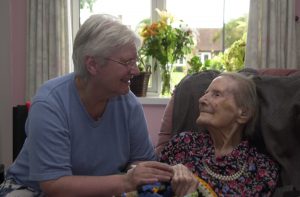We can’t imagine the horrors endured by the Yazidi people who fled from the slaughter of the terrorists in Iraq. Some have told their stories to the TV crews; terrible stories of men beheaded and women and children taken as slaves.
Thank God for the Kurdistan soldiers who used anything to hand – diggers, donkeys, tractors and trucks- to rescue them from the Sinjar mountain. Thank God, too, for the international aid that brought them food and water.
Among the stories were a few of frail older mothers who were carried by their sons . Dow Jones Newswire included an account of a 40 year old market stall holder, who carried his 90 year old mother to safety. Another man told how his sons had tried to carry his old mother, but the trauma was too much for her and she suffered a heart attack and died. Even in their extreme suffering, the Yazidis did their best to look after each other – including frail parents.
So what’s happening here?
In contrast, in the safe, comfortable, welfare-state UK almost 900,000 frail old folk who need help are being left to fend for themselves. They’re struggling even with basic tasks like washing and dressing. Analysis by Age UK shows the number of elderly people with unmet care needs has risen by nine percent since the previous estimate two years ago. (Elderly left to fend for themselves, The Daily Telegraph, Thursday, August 14, 2014.)
Is it too simple a question to ask – where are their families?
A hospital chaplain told me that he often came across elderly patients who were rarely visited by their families. Why is that? he would ask. Oh, they have such busy lives, they don’t have time, would be the answer, always.
One time an 85 year old neighbour asked if the chap who mowed my garden would do the same for hers, if she paid him. I asked why her robust son, who lived less than four miles away, didn’t come and do it for her. Her answer was the same as the hospital patients – no time. What they meant, really, was low priority. Their needs came well down their children’s priorities, if they were on them at all.
Thank God, it’s not always the case. There’s the man who called on his father, three times a day, every day, to make sure he was alright until he was taken into a care home, against his will. The son said he was ‘gutted’. There’s the daughter who travels across London to prepare a meal for her elderly parents every evening: the father is the mother’s carer, and he is developing dementia and the strain is incredible. And there are tens of thousands more, sometimes called the sandwich generation, who are caring for their own families and their elderly parents. Research a couple of years ago showed that many felt permanently exhausted, barely able to work and raise their own families.
Probably some of the 900,000 identified by Age UK had never had children, or even younger siblings.
But perhaps the answer is the way women in our society are expected to go out to work these days, even encouraged by subsidised child fees. Juggling work, children, husband and home takes emotional and physical energy, so could it be that having less time and energy to share with older parents means a loosening of the traditional links?
The Yazidis’ trek, where they carried their grandmothers to the mountain, was life threatening. It was short and sharp, and terrifying. For the 900,000 older people who can’t properly care for themselves here, it goes on, day after day. It may not be as instantly life threatening as the Yazidis, but it wears them away, one day at a time.















